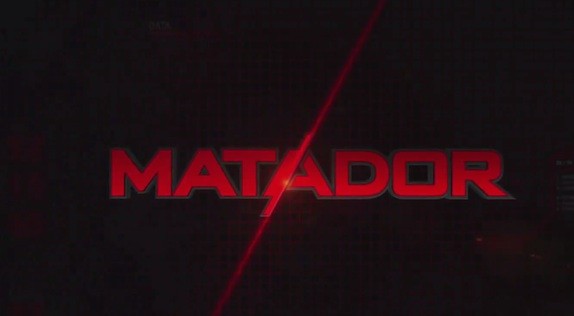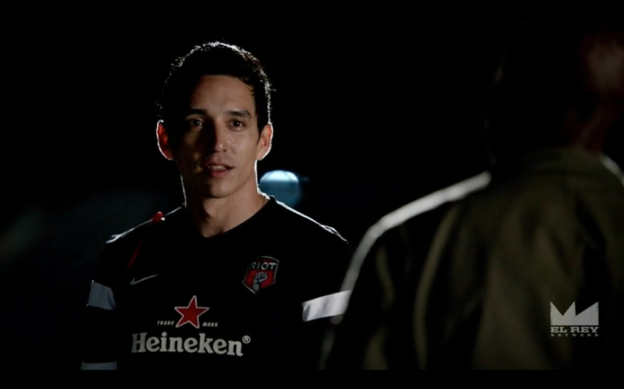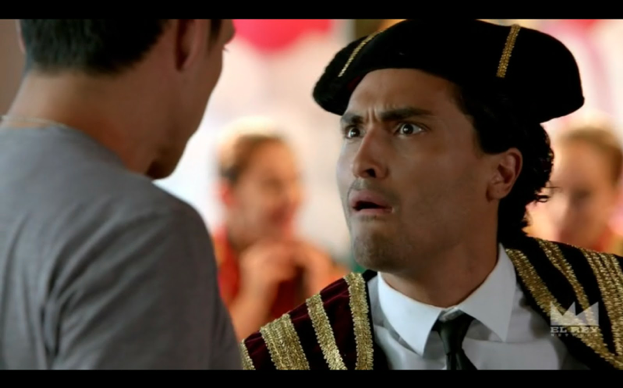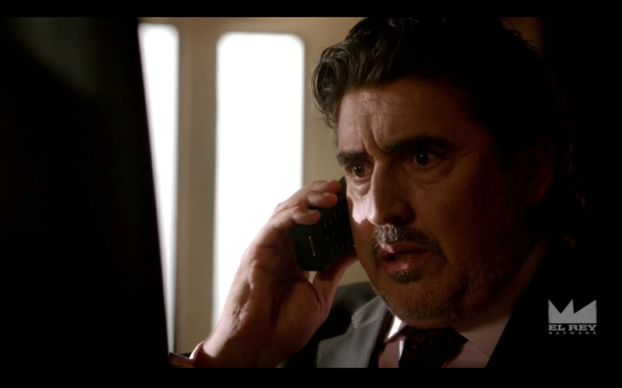By Benny Paul
If James Bond and Luis Suarez could somehow combine their DNA and produce a son, he might look a lot like Tony Bravo. He’s the soccer-playing, red-card-earning undercover-agent action hero created by Robert Rodriguez and his friends at the El Rey Network for Matador, a show as creatively hybridized as its main character.
Matador, which has just been renewed for a second season, introduces itself as a pretty generic undercover cop show. We open on Tony Bravo and a handful of other agents at a resort in Mexico. We see a white-walled hotel, palm trees, and long-legged extras in pink bikinis, just enough to tell us “this is a fancy resort where rich people go” and nothing more. Later on, many scenes will take place in the antagonist’s dimly-lit, blank office a set that tells us “this is a shady, powerful person’s office” and nothing more. When Tony gets his orders from the CIA, he goes to a generic-looking room with bright lights, glass, and steel. It’s that type of show, not the type of cinematic, detailed show you’d see on HBO, AMC, or the any of the Big Networks. We get what we need to progress the plot forward.
But this is El Rey. This is Robert Rodriguez’s network, and his sensibility is definitely felt in Matador. The show has so far featured a murder-by-machete, a flight to the Nicaraguan jungle, the burglary of a mysterious artifact, and a drug lord who is enjoys fish pedicures.
The much-promoted premise is this: secret agent Tony Bravo (Gabriel Luna) plays on the professional soccer team LA Riot in order to spy on shady telecommunications mogul Carlos Slim Andres Galan, who owns the team. Tony’s parents, sister and brother think that he has retired from intelligence work and is just a soccer player. They are very proud of his apparent athletic success, and Tony often wishes that he were the man his family thinks he is.
Despite its self-consciously far-fetched premise and the increasingly complex plot, Matador is, at its core, an easily digestible TV series about a good-hearted hero who loves his family, loves his team, and always saves the day.
The acting in Matador is just about as emotive and un-subtle as it should be. Tony Bravo has a tight-lipped sincerity that begs mockery, but Gabriel Luna makes it work. He’s a Bruce Willis-type of action hero–he succeeds at the difficult task of making you care just enough about the emotional life of an action star without it becoming burdensome. (Luna also manages to refer to sex as “playing hot dogs and doughnuts,” while keeping a straight face, which surely cannot be easy.)
Elizabeth Peña and Julio Oscar Mechoso as Tony’s parents and Isabella Gomez as his younger sister do just what they need to do: provide a warmth that contrasts with Tony’s intense undercover life, and remind us of the normalcy that he can never fully have. Jonny Cruz, as Tony’s delinquent brother Ricky, has the perpetual smirk of an amateur con man. Christina Ochoa rounds out the civilian cast as the archetypal “girl next door” who Tony has liked since high school, and who falls further and further out of reach as Tony becomes more entrenched in his secret life.
The rest of the cast rounds out Matador’s routinely wacky world. Nicky Whelan and Neil Hopkins are as cold and party-pooping as they should be as Tony’s CIA handlers, and Tanc Sade chews the scenery as Beckham-ite Alec Holester, an aging, high-maintenance British soccer star who loves LA women almost as much as he loves taking his shirt off.
Last and best is Alfred Molina as Andrés Galan, the shady owner of the LA Riot, and the apparent antagonist. Early on, the fun is in seeing Molina ham it up with melodramatic lines such as “This is Los Angeles. We need more than talent. We need stars!” But as the show progresses, the show’s writers hand the great character actor more and more material to work with, and Molina gets you to care, just a little bit, about this shady billionaire’s life.
Matador is an entertaining hodgepodge of styles, and part of the fun is that it never rests in one of its worlds for too long. If it’s getting too CIA-heavy, Tony’s brother is there to bring in some silly money-making scheme. If it’s too sitcom-y, Galan or the CIA handlers will whisk Tony off on a life-or-death mission. And don’t forget that this is also a show about sports: the soccer in Matador is a primary component.
Matador’s connection to American Latino culture also deserves to be discussed. Matador is certainly not the first TV show about English-speaking American Latinos, but it doesn’t have a lot of company, either. It is unapologetic about its heritage, and while the show doesn’t necessarily pander to Hispanic viewers, it certainly doesn’t feel the need to explain things on behalf of its non-Latin audience. When you look at the actors and realize that you’ve seen them in other places, it hits you that, outside of Matador, they tend to either downplay their heritage to play white characters, or to play stereotypical, marginal Hispanic characters. Matador’s offers these talented actors a chance to break that mold, and while calling this diversity “progressive” might be a bit strong, it does at the very least make the show just plain more interesting.
It would be easy for Matador to become too much of one thing, and, without giving too much away, I can warn you that it’s currently veering a little deeply into thriller mode. But as long as it continues to be the sports-adventure-comedy that its proven capable of being, Matador will have a lot worth watching for seasons to come.
Matador is on Tuesdays at 9pm on El Rey Network.
Benny Paul is a Brooklyn-based writer in the sense that he lives in Brooklyn and writes sentences. He has a degree in Literary Theory and Film Studies from SUNY Albany. He is also the creator of the blog YoungUrbanAmateur.com. It is mostly about musicians, unlike his Twitter account, which is mostly about Major League Soccer.





